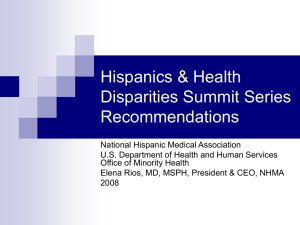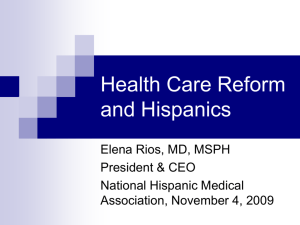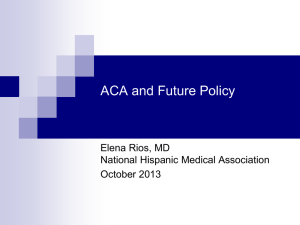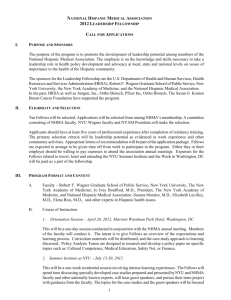Opportunities for Prevention within Health Care Reform
advertisement
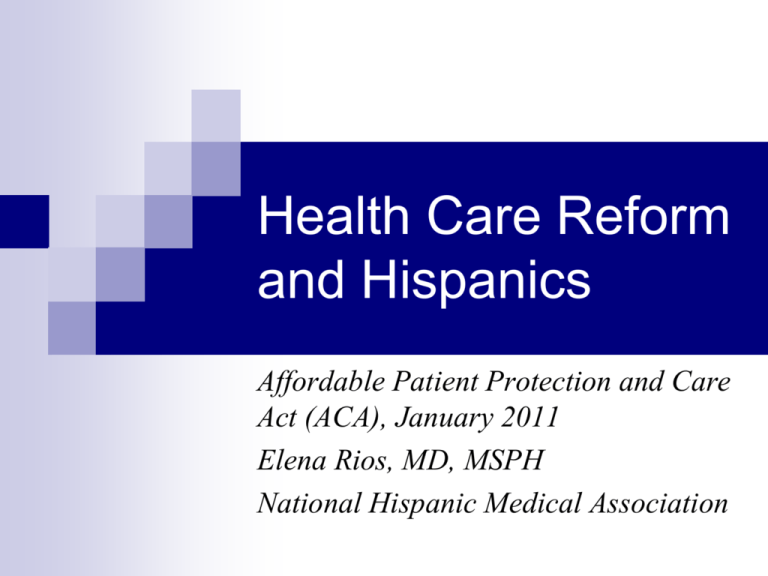
Health Care Reform and Hispanics Affordable Patient Protection and Care Act (ACA), January 2011 Elena Rios, MD, MSPH National Hispanic Medical Association Hispanics & Health Care The majority ethnic group in America 2042: one out of four Americans will be Hispanics Immigrants and mixed families, low education and income High rates of uninsured & problems with disparities in health care according to US DHHS Disparities Reports Limited cultural competence, language service System lacks Hispanic researchers, providers and leaders in public/private agencies Need for new approaches to increase Hispanics in primary care Need for cultural competence training about Hispanic populations NHMA & NHHF– Who are We? Established in 1994 in DC, NHMA is a non-profit 501c6 association representing 45,000 Hispanic physicians in the U.S. Mission: to empower Hispanic physicians to improve the health of Hispanic populations Established in 2002, NHMA’s foundation, National Hispanic Health Foundation, is a nonprofit 501c3 foundation for research & education activities – affiliated with and located at the NYU Wagner Graduate School of Public Service NHMA Board of Directors Ciro Sumaya, MD, MPHTM, Chair, former Dean, Texas A&M Rural Public Health School Kathy Flores, MD, Secretary, Director, UCSFresno Latino Research Center Louis Aguilar, MD, Treasurer, Tucson, AZ Sam Arce, MD, ViceChair/Chair – Council of Medical Societies Elena Rios, MD, President/CEO Washington, DC Carol Brosgart, MD, Medical Officer, Oakland Children’s Hospital Emilio Carrillo, MD, MPH, Professor, Cornell Weill School of Medicine Onelia Lage, MD, Professor, Pediatrics, Univ of Miami, FL Rosalio Lopez, MD, Vice President and Medical Officer, Presbyterian Intercommunity Hospital, Whittier, CA Jorge Puente, MD, Regional President of Asia, Pfizer Joan Reede, MD, MPH, Associate Dean, Harvard School of Medicine Jaime Rivera, MD, Consultant, State Corrections, Dover, DE Reed Tuckson, MD, Vice President, UnitedHealth Group, Minnetoka, MN Richard Zapanta, MD, Monterey Park, CA Alvaro Galvis, Coordinator, Latino Medical Students Association NHHF Board of Directors Mark Diaz, MD Chairman, Principal, Alivio Medical Group, Sacramento, CA Conchita Paz, MD Secretary -Treasurer, Principal, Family Care Associates, Las Cruces, NM Elena Rios, MD, MSPH President, NHHF, NY Jo Ivey Boufford, MD President, New York Academy of Medicine Gary Pelletier Director, Pfizer Helpful Answers Miguel Sanchez, MD Professor, Dermatology NYU School of Medicine I. Access to Health Coverage Individual mandates, affordable - 2013 Subsidies based on income Max of 10% income on premiums Dependent to age 26 Family can apply as a unit Employer insurance, ineligible for low income tax credit thru the Health Insurance Exchange Employer mandates I. Access to Public Health Care Programs Medicaid – Nationwide: 133% FPL, childless adults Dual eligibles – new CMS office to monitor Medications – benefit by 2014 Territories’ caps increase by 30% & FMAP increases by 5% (new eligibles don’t count) DSH – state trigger as uninsured decreases CHIP 133-250%FPL, cost sharing up to 5% income Barriers: verification, immigrant 5yr wait I. Access:New Health Insurance State Health Insurance Exchanges Voluntary enrollment to qualified individuals to select qualified health plans Websites, Ombudsman systems New grants for community health workers to assist with enrollment, provide information that is culturally and linguistically appropriate II. Quality & Efficiency National strategy to improve health care quality AHRQ – standards/ CMS – inform, payments HHS lead - strategic plans, incentives w/public and private payers, mandates racial/ethnicity and language data Office of Minority Health at OS, CDC, FDA, HRSA, CMS, SAMHSA; Institute for Minority Health and Health Disparities at NIH Key National Indicator System (and Independent Institute by the National Academy of Sciences) Pt outcomes and functional status, H-IT, pt safety, effectiveness, pt centeredness, appropriateness, efficiency, equity of services and health disparities, patient satisfaction II. Quality & Efficiency Patient Centered Outcomes Research Institute Public/Private new entity AHRQ and NIH research on health disparities Advisory Committee, public input, report to Congress Build capacity at the State and community level to lead quality and safety efforts through education, training and mentoring programs Demo Program to Integrate QI and Pt Safety training into clinical education of health professionals II. Reimbursement for Quality under the Plan or Coverage* case management care coordination chronic dz management medication and care compliance medical home prevention of hospital readmissions patient safety reduction of medical errors evidence based medicine health IT child health measures culturally and linguistically appropriate care mental health II. Quality and Providers Hospital Value Based Purchasing – paying for performance on quality measures, funding from Hospital Trust Fund, Fed Suppl Med Ins Trust Fund, Medicare IPPS payments to CMS Physician Value Based Purchasing Goal - Attaining a standard or making performance improvements Physician Quality Registration Identifier Maintenance of Certification (new) Feedback & Appeals process (new) Quality monitoring to start for nursing homes, rehab, hospices, cancer hospitals III. Prevention National Prevention, Health Promotion and Public Health Council (Fed agencies under HHS) Provide coordination and leadership at the Federal level with respect to prevention , health promotion, public health system and integrative health care in the US Develop a National Prevention and Health Promotion Strategy – health disparities priority, includes cancer Prevention and Health Promotion Investment Fund ($10B) III. Prevention – New Programs Right Choices Programs School clinics Worksite wellness Community Transformation Grants Healthy Aging Grants (55-64) Food labeling, restaurant menus, school vending machines – decrease obesity Health Impact Assessments III. Prevention and Wellness Incentives for healthy lifestyles initiatives $100M for Medicare and Medicaid Monitor beneficiary participation and health outcomes States to improve coverage and access to preventive services and immunizations with 1% increase FMAP Medical Homes Integrated Care IV. Health Care Workforce National Health Care Workforce Commission – HHS, DEd, DOL Integrated health workforce training, capacity Medicare/Medicaid GME Nursing, oral, mental, allied, and public health workforce, diversity Geographic distribution of providers vs need Increased focus on primary care providers IV. Health Care Workforce State Health Workforce Planning & Development Grants – HRSA ($158M) State partnerships (25% match) Seed grants to regional partnerships Career pathway guidance, training Change State and local policies for health care career pathways and workforce development Performance benchmarks IV. Health Care Workforce National Center for Health Care Workforce Analysis ($5M) & Advisory Committees State and Regional Centers ($4.5M) Data from HHS, Bureau of Labor Stats, Census Bureau, DOD, VA, medical societies and health professions organizations Grants for longitudinal evaluation of students, faculty, residents who have received training & funding, NHSC – MUA, primary care practice, diversity IV. Health Care Workforce Loan Repayment Programs Advanced Practice Nurse managed health clinics – associated with school, university, FQHC or nonprofit Primary Care Training – GIM, Peds, FP, added: PA National Health Service Corps – HPSAs Nursing, Dental, Allied Health, Pediatric Adolescent, mid-career Public Health, Faculty Training in cultural competence and health literacy Priority for track record of training minorities, rural, disadvantaged Innovation in primary care models, integrative care Diversity – Title VII COE, HCOP expansion IV. Primary Care Extension State(s) Hub and Local Agencies AHRQ -Required Activities: learning communities in primary care, share best practices, community providers to create new knowledge – health disparities; other: home health. State Hub – State Health Dept, health profession schools, medical societies Coordinate QIO and AHECS – we support adding Diversity Programs: HCOP/COE IV. Health Care Workforce Medicare Medicare participation: 10% bonus for: PC doctors, general surgeons, docs in HPSAs Redistribution of residency slots to PC Training in outpatient clinics (funds to hospitals with agreements with clinics) Training demo grants ($85M/yr x 5 yrs) Low income (TANF); home care doctor/nurse care SGR – need to revise Reconciliation Bill Access – 32 million insured – making bill more affordable, closing the donut hole Accountability of insurance companies Increased Medicaid/Clinics to all states Additional GOP issues included Fraud and waste Malpractice courts demonstration program Increase Medicaid reimbursement – MDs Health savings accounts How to contact NHMA & NHHF NHMA - www.nhmamd.org NHHF - www.nhmafoundation.org Hispanic Health Portal www.hispanichealth.info NHMA 15th Annual Conference – “Health Care Reform Implementation for the Hispanic Community” – Washington, DC, Mar. 17-20, 2011
